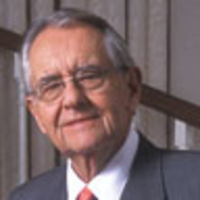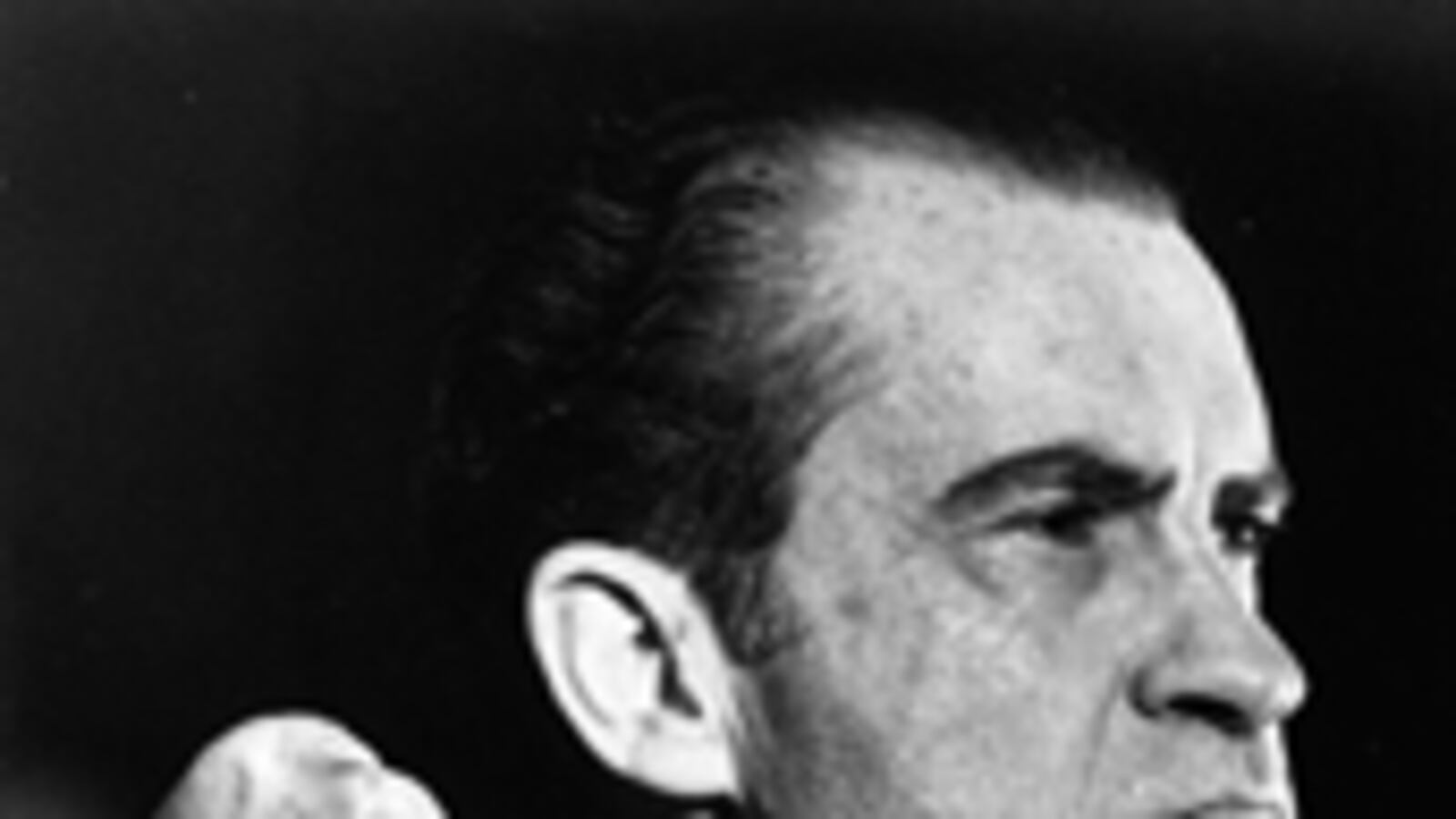
The morning after Richard Nixon’s historic landslide reelection victory in 1972, the members of the Cabinet were summoned to the White House. I assumed, as did the other secretaries, that the president wanted us to share in the celebration. Perhaps he would spell out his vision for what he wanted to accomplish in the second term after the significant achievements of the first.
But soon after we were ushered into the Cabinet Room, I saw Nixon in a pose I recognized. He was slouched as he walked in, his shoulders hunched, his neck thrust forward so that he seemed to be looking out from a dark corner. This was almost always a bad sign.
As [Nixon] spoke, my mind raced. Surely he wasn’t offering me secretary of State. Henry would certainly get that.
When we all sat down, the president delivered a brooding monologue, including the observation that this second term would not be like Disraeli’s, the British prime minister who served in 1868 and again from 1874 to 1880. It was impossible to know precisely what he meant, for that second term had advanced equality in England and produced treaties reshaping Eastern Europe. What was disorienting was that a day after whipping George McGovern by 18 million popular votes and 520 electoral votes versus 17, the president was in a dark mood when one would have obviously expected just the opposite. Why wasn’t he giddy with happiness, especially since this would be his last election and all around him at the table were some of his oldest and most loyal friends and supporters hoping to uncork some Champagne and raise a glass to his success?

As this sober so-called celebration—no Champagne, no toasts to the future of a winning team—started to break up, Haldeman told us all to wait. He then rushed after the president as he retreated, still slumped, into the Oval Office. Moments later, Haldeman returned to “remind” us that the president expected all of our resignations immediately. The president had issued the same order to the senior staff—but as usual, Nixon had left the unpleasant work to others. In the aftermath, the euphoria of election night gave way to depression, anxiety, and genuine puzzlement. News reports said later it was the first time a president had asked his entire Cabinet to resign.
I had been back in my cavernous office in the Commerce Building—someone once likened it to the Hall of Mirrors at Versailles without the mirrors—for only a short time when my secretary told me the president wanted to see me at Camp David the next day. Caspar Weinberger, an old Nixon friend who was then director of the Office of Management and Budget, was the other invitee. Cap, as he was known, had succeeded George Shultz as director of management and budget when Nixon appointed George to be secretary of the Treasury the previous May. Cap also had long California ties to Nixon.
We boarded the Marine helicopter at the White House pad the next morning. On the clattering flight out to Camp David in western Maryland, we joked back and forth uneasily about where the trapdoor was in the helicopter floor that would open and suck us through into political oblivion. But we reached Camp David in one piece, and there was no trapdoor for Cap. Nixon offered him secretary of Health, Education, and Welfare, a major assignment and a step up career-wise. For me, the trapdoor was camouflaged.
The president ushered me into a rustic Camp David living room—the place had originally been built as a camp for families, then converted to a presidential retreat by Franklin Roosevelt during World War II when German U-boats made the boating vacations he preferred too dangerous. Despite the casual setting, the president wore his usual dark suit, white shirt, and tie. Outside, leaves swirled, but even the fall colors at their peak paled against the purple shades of rhetoric Nixon laid on me. He told me he had read all the stories contending I was the best Commerce secretary since Herbert Hoover. They weren’t true, he said. I was better than Hoover. There was no comparison. What Henry Kissinger and I had achieved in the integrated commercial and strategic negotiations with the Soviet Union was remarkable. And speaking of Henry, he and George Shultz both held me in genuine respect, something that could not be said of anyone else in the administration. Furthermore, I had total support of the business community. Later developments made me wish I had his very generous words on tape!
As he spoke, my mind raced. Surely he wasn’t offering me secretary of State. Henry would certainly get that. Perhaps Treasury, if he had a new assignment for George Shultz. Did he want me to be secretary of Defense?
The president moved from my supposedly fine qualities to a new foreign-policy initiative he had in mind. In 1972, he had built bridges to our former adversaries, China and the Soviet Union. It was now time to rebuild them to our friends in Europe. He meant for 1973 to be the “Year of Europe,” a year in which our relationships with Western Europe, principally Great Britain, Germany, and France, were to be redefined. France, in particular, clung to the Gaullist illusion of its singularity and remained aloof to close trans-Atlantic ties. But Nixon reminded me that I had once advocated integrating negotiations with our principal European allies across a wide front of issues that included trade, defense, and energy. Now was the time to pursue that course, he said, and I was the man.
He proposed to name me the first United States ambassador to Europe. This new post would combine ambassadorships to NATO, the European Economic Community or Common Market, the Organization for Economic Co-operation and Development, virtually every multinational European-based entity. Looking back, it probably wasn’t even legal.
I would be based in Brussels, the de facto capital of this emerging Europe. Brussels and its old stone guild houses were not exactly what I had in mind when I was imagining my future. Still, I could see the possibilities. It was a bold concept that offered challenging negotiating opportunities. And the chance to work side by side with both Kissinger and Shultz made the prospect that much sweeter.
I told the president it was intriguing but that I wanted to think it over, partly, I said, to figure out how to do the job effectively. Back in Washington, I checked in with a wise old head and longtime friend, Peter Lisagor, who headed the Washington office of the Chicago Daily News.
“It’s an interesting offer, Pete,” he said. “But you should make sure they aren’t just shipping you out to the other end of a telephone that will never ring.”
Bureaucratic rosters are full of just such people. Their positions sound lofty and come with all the perquisites—limos, fine offices, diplomatic housing. But for all the appearance of prestige, the jobs are so vaguely defined that measures of performance are difficult if not impossible to make. Ultimately, one wonders if performance was the object in the first place, or just an assignment to tread water, or worse, a way to get someone out of Washington. That, clearly, wasn’t what I wanted. But what Nixon had proposed seemed different, a position that offered real possibilities.
Still, I was not entirely convinced. I really didn’t want to take the kids out of school in the middle of the year to go to Brussels, another drastic change of their environment. Moreover, to tackle negotiations on such a broad scale would require a lot of planning. I would have to work out a detailed plan of negotiation, and the departmental concerns of Shultz at Treasury, Bill Rogers at State, Melvin Laird at Defense, and, of course, the national security picture under Kissinger would all have to be fully considered. This would take some time here in the United States.
I called John Ehrlichman with a straightforward proposal. I told him I would go to Brussels in six months. During the interim, I would work with Henry, George, Bill, and Mel on a negotiating plan. By next June—1973—when the school year was over, I would move my family to Brussels. Henry and George had told me that made sense to them.
Ehrlichman paused, then said he would have to call me back. He did, within five minutes. No, he said, moving in six months would not be acceptable. Go now, or not at all.
Sobered, I thought of Peter Lisagor’s prescient warning. The White House was indeed shipping me off to the far end of a telephone that would rarely ring.
Excerpted from The Education of an American Dreamer by Peter G. Peterson. © 2009. With permission from the publisher, Twelve.
Plus: Check out Book Beast, for more news on hot titles and authors and excerpts from the latest books.
Peter G. Peterson is chairman emeritus and cofounder of The Blackstone Group, chairman emeritus of the Council on Foreign Relations, founding chairman of the Peterson Institute for International Economics, founding president of The Concord Coalition, and retired chairman of the Federal Reserve Bank of New York. He is also the founding chairman of the Peter G. Peterson Foundation. His most recent book, Running on Empty, was a national bestseller.






